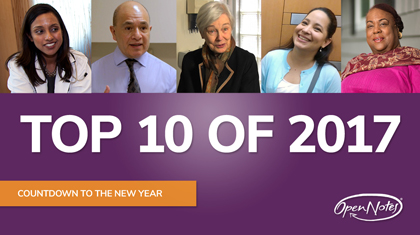
It’s been a remarkable year for OpenNotes!
In 2017 the number of health systems sharing notes and the number of patients with access to notes doubled. We’re excited by the momentum OpenNotes is gaining, but there’s still plenty of work ahead.
Here are ten highlights from 2017 that have us energized for the New Year.
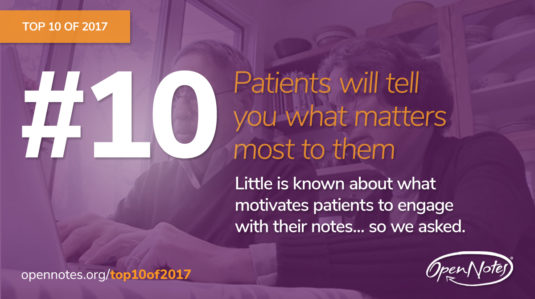 #10: Patients will tell you what matters most to them.
#10: Patients will tell you what matters most to them.
When we asked what patients value most about access to notes, here’s what they emphasized:
1. Being able to remember next steps in their care.
2. Having quicker access to and deeper understanding of test results.
3. Feeling positive about their doctors.
4. Having the ability to share information with caregivers.
Read more about the study, published in JMIR.
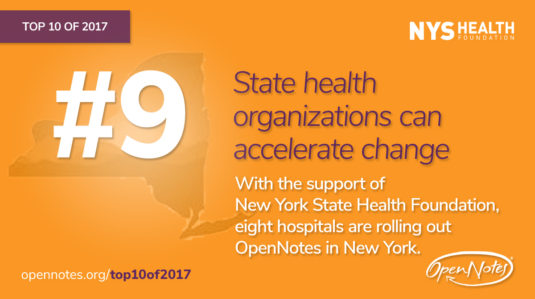 #9: State health organizations can accelerate change.
#9: State health organizations can accelerate change.
The New York State Health Foundation set a high bar in its commitment to transparency in health care by announcing its support of OpenNotes and issuing grants for OpenNotes implementations to eight health systems in New York State.
Learn which hospitals will be spreading OpenNotes in New York State.
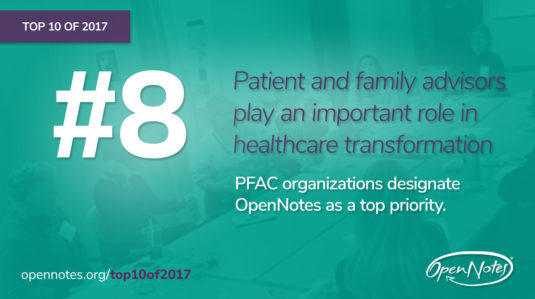 #8: Patient and family advisors have an important role in healthcare transformation.
#8: Patient and family advisors have an important role in healthcare transformation.
At a national meeting in Washington, D.C., the Institute for Patient- and Family-Centered Care (IPFCC) announced support of OpenNotes as one of the major action items for patient and family advisory councils (PFACs) around the country. Joined in this work by Patient & Family Centered Care Partners (PFCCPartners) and Utah HealthInsight, these organizations are on the forefront of helping health systems engage more meaningfully with patients and care partners.
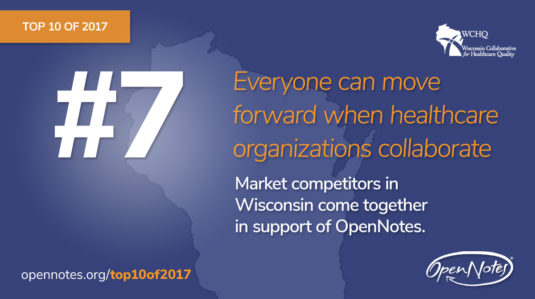 #7: Everyone can move forward when healthcare organizations collaborate.
#7: Everyone can move forward when healthcare organizations collaborate.
Though they are market competitors, members of the Wisconsin Collaborative for Healthcare Quality came together in support of OpenNotes as a way to improve the quality and affordability of health care for all in their state. This group follows the lead of the Northwest OpenNotes Consortium in Oregon and Washington State.
Read more about OpenNotes in Wisconsin.
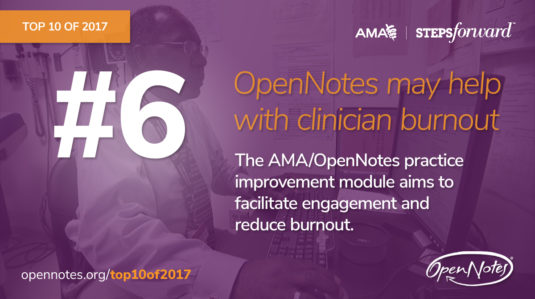 #6: OpenNotes may help with clinician burnout.
#6: OpenNotes may help with clinician burnout.
The American Medical Association (AMA) invited OpenNotes to collaborate in developing a Steps Forward practice improvement module. Aimed at facilitating engagement and reducing burnout, doctors earn continuing medical education (CME) credit by completing the module, “Adopting OpenNotes: Partnering with Patients.”
Check out the AMA Steps Forward module.
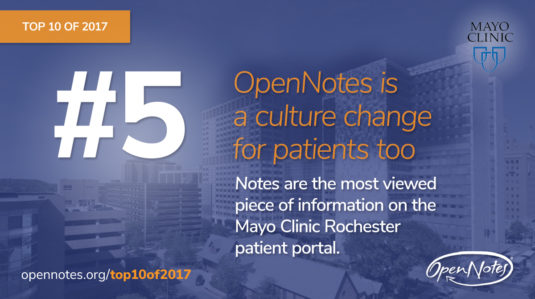 #5: OpenNotes is a culture change for patients too.
#5: OpenNotes is a culture change for patients too.
Few patients know that clinicians write notes so OpenNotes may take some getting used to. Sharing communication materials makes quite a difference. The first thing patients see when accessing the Mayo Clinic Rochester online patient portal is a reminder about visit notes, and as a result of Mayo’s communications efforts, notes are viewed more often on their portal than any other information, including lab results.
Here’s how Mayo Clinic and other systems are communicating with patients.
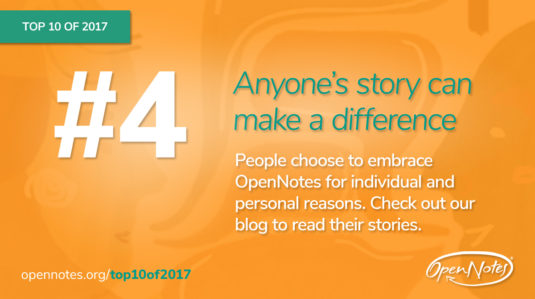 #4: Anyone’s story can make a difference.
#4: Anyone’s story can make a difference.
People choose to embrace OpenNotes for individual and personal reasons – they want to improve the safety of care, they’re a caregiver and need information, they believe it’s the right thing to do. We started The Same Page Blog to share the experiences of patients, clinicians, health IT experts, and others, including ways they are working with us to change the culture of care.
Read more from the individuals who have contributed to our blog.
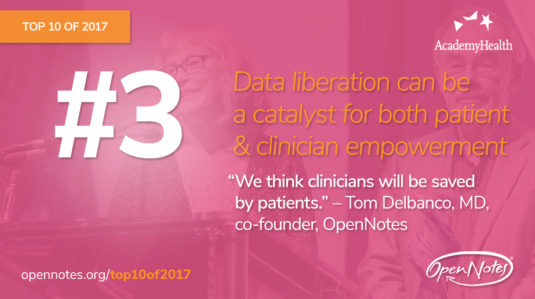 #3: Data liberation can be a catalyst for both patient and clinician empowerment.
#3: Data liberation can be a catalyst for both patient and clinician empowerment.
Studies suggest that inviting patients to access information in their medical records helps them to participate more actively in their care and may also enhance the work lives of clinicians. In accepting the Health Data Liberator award from Academy Health, OpenNotes co-founder, Tom Delbanco, MD, remarked, “We think clinicians will be saved by patients.”
Learn why Academy Health chose OpenNotes for this award.
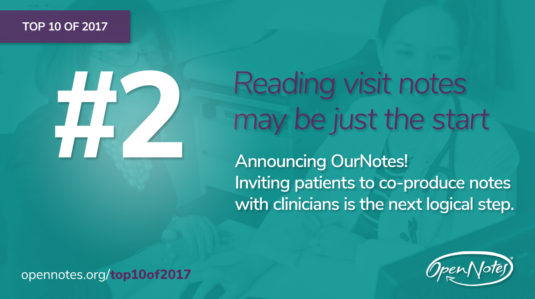 #2: Reading visit notes may be just the start.
#2: Reading visit notes may be just the start.
Even as we work to make OpenNotes the standard of care, we are increasingly convinced that inviting patients to co-produce notes with clinicians is the next logical step. We call this “OurNotes.” Based on initial study results, we’ll test OurNotes at four pilot sites starting in 2018.
Read about the Annals study and the pilot sites.
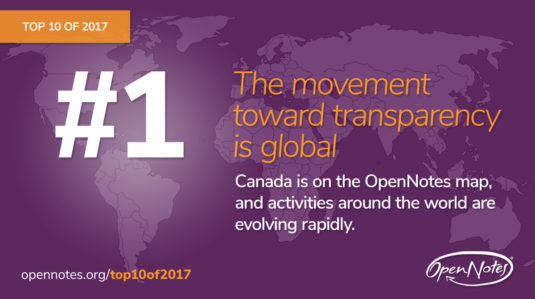 #1: The movement toward transparency is global.
#1: The movement toward transparency is global.
In March, we met up with teams of patients and clinicians representing 11 countries: Australia, Brazil, Canada, Chile, England, Germany, India, Japan, Sweden, Switzerland, and the United States at the Salzburg Global Seminar Session 553: Toward a Shared Culture of Health: Enriching and Charting the Patient-Clinician Relationship. Canada is on our map now, and activities around the world are evolving rapidly. OpenNotes is becoming an international movement!




You must be logged in to post a comment.